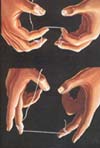Dental Hygiene
How often should I replace my toothbrush?
 Treat yourself to a new toothbrush every three to four months, or sooner if the bristles become worn, splayed or frayed. Most toothbrushes that are sold today are medium or soft bristled. This prevents the bristles from irritating the gums. A hard, brittle brush can injure your gums. Children's brushes may need to be replaced more often, as they can wear them out more quickly because they seem to chew on them.
Treat yourself to a new toothbrush every three to four months, or sooner if the bristles become worn, splayed or frayed. Most toothbrushes that are sold today are medium or soft bristled. This prevents the bristles from irritating the gums. A hard, brittle brush can injure your gums. Children's brushes may need to be replaced more often, as they can wear them out more quickly because they seem to chew on them.
What is the proper way to brush my teeth?
Thorough brushing twice a day, and cleaning between the teeth daily with floss or other interdental cleaners, removes plaque.
Keep these tips in mind when brushing your teeth.
- Use a soft-bristled toothbrush.
- Place the brush at a 45-degree angle to the teeth and use a gentle tooth-wide, back-and-forth motion.
- Remember to clean the inside teeth surfaces where plaque deposits are heavy, and clean the back teeth and tongue.
- Replace your brush when the bristles become frayed or worn — about every three to four months.
How do I clean between teeth?
 Floss and other interdental cleaners remove plaque from between the teeth and under the gumline, areas where the toothbrush can't reach. If you haven't been in the habit, it's never too late to start.
Floss and other interdental cleaners remove plaque from between the teeth and under the gumline, areas where the toothbrush can't reach. If you haven't been in the habit, it's never too late to start.
When flossing, keep in mind these tips.

- Gently ease the floss between the teeth and gumline, never snap it.
- Form a "c" against the sides of both teeth and gently rub the floss up and down the tooth, moving it from under the gumline to the top of the tooth. Establish a regular pattern of flossing and remember to floss the backside of the last teeth.
- If you use interdental cleaners, ask us how to use them properly, to avoid injuring your gums.
What can you do for bad breath?
Chronic bad breath is a problem for over 90 million people. Typically, halitosis is caused by poor oral hygiene that leaves decaying food particles and bacteria in the mouth. Or, it may be due to gum disease and tooth decay. In either case, decay and debris produce sulfur compounds just like the kind found in rotten eggs, resulting in foul-smelling breath.
Although many people try breath mints, over-the-counter mouth rinses or sugar-free gum as a means of controlling bad breath, these products only temporarily relieve the symptoms without treating the cause.
Instead, the first step in controlling bad breath is to practice good oral hygiene: twice daily brushing, daily flossing, and tongue cleaning. We can review your home care to make sure that all sources of bacteria are controlled, from brushing and flossing techniques. In fact, a plastic tool called a tongue scraper will actually allow you to clean away bacterial build-up on your tongue and significantly alleviate odor. And good hygiene must include regular dental check-ups, since professional cleanings do a much more thorough job of eliminating bacteria and plaque build-up.
A second step to note is that if you have dentures or a removable retainer or mouth-guard, you must also practice excellent hygiene each time you remove the appliance, cleaning it thoroughly and according to proper instructions.
Third is making sure your mouth is free from infection (decay and gum disease are infections). Periodontal disease will certainly create a bad smell but is much more serious than just the smell because periodontal disease breaks down and eventually erodes the bone.
Less commonly, bad breath may result from a systemic problem such as a sinus infection, digestive disorder, diabetes, kidney failure, or liver malfunction. In these cases, we’ll refer you for a medical consultation. Radiation treatment for cancer may produce a dry mouth that leads to halitosis, as well. And several simple, non-medical conditions can occasionally have a temporarily negative effect on your breath: stress, dieting, snoring, advancing age, and hormonal changes. Regardless of the source, it's important to realize that bad breath is treatable and steps can be taken to correct it.
We do see a few people who have bad breath for none of these reasons. In those cases, it's the type of bacteria that normally reside in their mouth that is producing the odor.
